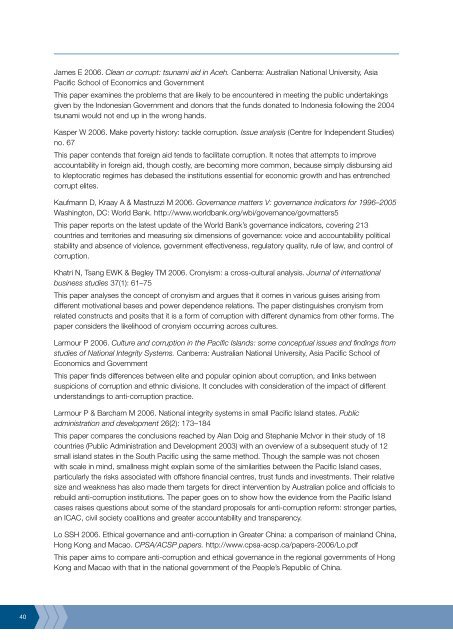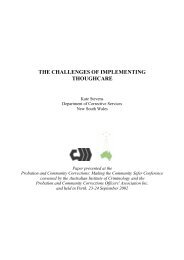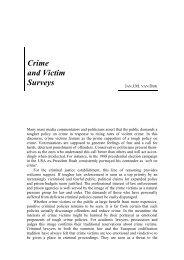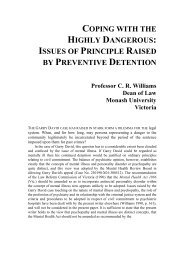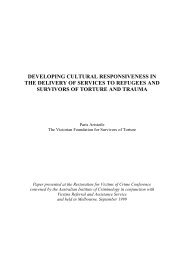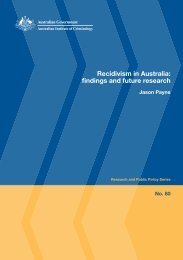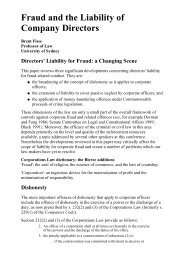Review of anti-corruption strategies Rob McCusker - Australian ...
Review of anti-corruption strategies Rob McCusker - Australian ...
Review of anti-corruption strategies Rob McCusker - Australian ...
Create successful ePaper yourself
Turn your PDF publications into a flip-book with our unique Google optimized e-Paper software.
0<br />
James E 2006. Clean or corrupt: tsunami aid in Aceh. Canberra: <strong>Australian</strong> National University, Asia<br />
Pacific School <strong>of</strong> Economics and Government<br />
This paper examines the problems that are likely to be encountered in meeting the public undertakings<br />
given by the Indonesian Government and donors that the funds donated to Indonesia following the 2004<br />
tsunami would not end up in the wrong hands.<br />
Kasper W 2006. Make poverty history: tackle <strong>corruption</strong>. Issue analysis (Centre for Independent Studies)<br />
no. 67<br />
This paper contends that foreign aid tends to facilitate <strong>corruption</strong>. It notes that attempts to improve<br />
accountability in foreign aid, though costly, are becoming more common, because simply disbursing aid<br />
to kleptocratic regimes has debased the institutions essential for economic growth and has entrenched<br />
corrupt elites.<br />
Kaufmann D, Kraay A & Mastruzzi M 2006. Governance matters V: governance indicators for 1996–2005<br />
Washington, DC: World Bank. http://www.worldbank.org/wbi/governance/govmatters5<br />
This paper reports on the latest update <strong>of</strong> the World Bank’s governance indicators, covering 213<br />
countries and territories and measuring six dimensions <strong>of</strong> governance: voice and accountability political<br />
stability and absence <strong>of</strong> violence, government effectiveness, regulatory quality, rule <strong>of</strong> law, and control <strong>of</strong><br />
<strong>corruption</strong>.<br />
Khatri N, Tsang EWK & Begley TM 2006. Cronyism: a cross-cultural analysis. Journal <strong>of</strong> international<br />
business studies 37(1): 61–75<br />
This paper analyses the concept <strong>of</strong> cronyism and argues that it comes in various guises arising from<br />
different motivational bases and power dependence relations. The paper distinguishes cronyism from<br />
related constructs and posits that it is a form <strong>of</strong> <strong>corruption</strong> with different dynamics from other forms. The<br />
paper considers the likelihood <strong>of</strong> cronyism occurring across cultures.<br />
Larmour P 2006. Culture and <strong>corruption</strong> in the Pacific Islands: some conceptual issues and findings from<br />
studies <strong>of</strong> National Integrity Systems. Canberra: <strong>Australian</strong> National University, Asia Pacific School <strong>of</strong><br />
Economics and Government<br />
This paper finds differences between elite and popular opinion about <strong>corruption</strong>, and links between<br />
suspicions <strong>of</strong> <strong>corruption</strong> and ethnic divisions. It concludes with consideration <strong>of</strong> the impact <strong>of</strong> different<br />
understandings to <strong>anti</strong>-<strong>corruption</strong> practice.<br />
Larmour P & Barcham M 2006. National integrity systems in small Pacific Island states. Public<br />
administration and development 26(2): 173–184<br />
This paper compares the conclusions reached by Alan Doig and Stephanie McIvor in their study <strong>of</strong> 18<br />
countries (Public Administration and Development 2003) with an overview <strong>of</strong> a subsequent study <strong>of</strong> 12<br />
small island states in the South Pacific using the same method. Though the sample was not chosen<br />
with scale in mind, smallness might explain some <strong>of</strong> the similarities between the Pacific Island cases,<br />
particularly the risks associated with <strong>of</strong>fshore financial centres, trust funds and investments. Their relative<br />
size and weakness has also made them targets for direct intervention by <strong>Australian</strong> police and <strong>of</strong>ficials to<br />
rebuild <strong>anti</strong>-<strong>corruption</strong> institutions. The paper goes on to show how the evidence from the Pacific Island<br />
cases raises questions about some <strong>of</strong> the standard proposals for <strong>anti</strong>-<strong>corruption</strong> reform: stronger parties,<br />
an ICAC, civil society coalitions and greater accountability and transparency.<br />
Lo SSH 2006. Ethical governance and <strong>anti</strong>-<strong>corruption</strong> in Greater China: a comparison <strong>of</strong> mainland China,<br />
Hong Kong and Macao. CPSA/ACSP papers. http://www.cpsa-acsp.ca/papers-2006/Lo.pdf<br />
This paper aims to compare <strong>anti</strong>-<strong>corruption</strong> and ethical governance in the regional governments <strong>of</strong> Hong<br />
Kong and Macao with that in the national government <strong>of</strong> the People’s Republic <strong>of</strong> China.


